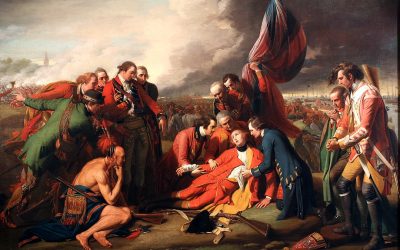The Seven Years’ War (1756-1763), often dubbed the first “world war,” was a global conflict that extended far beyond its European roots. It involved major global powers and affected territories in North America, India, Africa, and the Caribbean.
This conflict saw the British Empire pitted against the Bourbon dynasties of France and Spain, with other European powers like Prussia, Austria, and Russia playing pivotal roles. Its causes were multifaceted, rooted in colonial competition and European rivalries, leading to a war that reshaped the world’s geopolitical landscape. The Seven Years’ War offers a study of military strategy, diplomacy, and the dynamics of empire-building, setting the stage for the modern era.
Causes of the war
The Seven Years’ War was the culmination of escalating tensions and longstanding rivalries. At its heart were disputes over colonial territories and influence, which became intertwined with the complex web of European alliances and animosities.
Immediate Causes:
- Territorial disputes in North America: The British and French empires clashed over dominion of North America, highlighted by the French and Indian War, which was part of the larger global conflict.
- Struggles in Europe: Austria sought to regain Silesia, which Prussia had taken in the War of the Austrian Succession, while France aimed to limit Prussian expansion and strengthen its own position in Europe.
Long-term Tensions:
- Anglo-French rivalry: Decades of commercial competition and naval skirmishes had fostered deep-seated enmity between Britain and France, influencing their colonial ambitions.
- The Diplomatic Revolution of 1756: The unexpected alliance between traditional rivals France and Austria against Prussia and Britain reshaped the European diplomatic landscape and set the stage for war.
These causes sowed the seeds of conflict, entangling the major powers in a web of alliances and enmities that would ignite into the Seven Years’ War.
Major theatres of war
The Seven Years’ War was fought across multiple continents, highlighting its status as the first global conflict. Each theatre had its strategic importance and unique set of outcomes.
European theatre
Central to the war was the struggle for dominance within Europe. Major battles occurred across the continent, from Prussia’s invasion of Saxony to the French and British engagements in the Mediterranean. Prussia’s stand against Austria, France, Russia, and Sweden was pivotal, and Frederick the Great emerged as a military genius for his defensive strategies.
North American theatre (French and Indian War)
In North America, the war was characterised by British and French competition for control of the continent. The British victory in the Battle of the Plains of Abraham and the subsequent capture of Quebec marked a turning point, leading to British dominance in North America.
Asian and Caribbean theaters
In India, the conflict was part of the wider struggle between Britain and France for dominance, culminating in the British victory at the Battle of Plassey. This established British supremacy in the region.
The Caribbean saw several naval battles and skirmishes over islands crucial for sugar production, a lucrative part of the colonial economy.
Each theatre contributed to the complexity of the war, affecting not only the immediate participants but also shaping the future of global imperialism.
Key Battles and turning points
The Seven Years’ War was marked by several decisive battles and campaigns that shifted the balance of power and had lasting effects on the geopolitical landscape.
Battle of Plassey (1757)
This battle was a decisive victory for the British East India Company over the Nawab of Bengal and his French allies. Commanded by Robert Clive, the British forces secured control of Bengal, laying the foundation for British colonial rule in India. The Battle of Plassey was significant for its immediate outcome and for establishing British supremacy in India, leading to the eventual control of the entire subcontinent.
Battles of Rossbach and Leuthen (1757)
In a remarkable demonstration of military prowess, Frederick the Great of Prussia led his forces to victory against the French and the Austrians at Rossbach and Leuthen, respectively. These victories were pivotal for Prussia, demonstrating Frederick’s strategic genius and securing Prussia’s status as a major European power. Despite being outnumbered, the Prussian army’s mobility and tactical innovation led to these landmark victories.
The Siege of Quebec (1759)
A pivotal moment in the North American theatre was the British siege and subsequent capture of Quebec. The battle fought on the Plains of Abraham was brief but crucial. The British victory under General James Wolfe led to the fall of New France, with Britain seizing control of Canada. This battle significantly altered the balance of colonial power in North America.
These battles, among others, were turning points in the war, demonstrating the importance of leadership, strategy, and the shifting alliances that characterised the conflict.
Consequences and legacy
The end of the Seven Years’ War brought significant changes to the global order, reshaping borders and empires and setting the stage for future conflicts.
Treaty of Paris (1763)
The war concluded with the Treaty of Paris in 1763, which had profound implications for the colonial and European landscapes. France ceded Canada and its claims to lands east of the Mississippi River to Britain, while Spain transferred Florida to Britain in exchange for the return of Havana. France retained its Caribbean islands and regained some African outposts, significantly reshuffling colonial possessions.
Setting the stage for future conflicts
The redistribution of territories and the diplomatic shifts set the stage for future European conflicts, including the American Revolution and the Napoleonic Wars.
In North America, the seeds of future rebellion were sown among the British colonies, discontent brewing over newfound British policies and taxes. The indigenous populations faced new challenges and threats to their lands and ways of life, caught between the shifting powers of European empires.
The Seven Years’ War was more than a conflict between European powers; it was a global contest for supremacy that reshaped the world. Its legacy is evident in the modern boundaries of states, the rise of the British Empire as a preeminent global power, and the seeds of dissent it sowed in colonial territories.
The war’s aftermath reshaped not only maps but also societies and cultures, setting the stage for the next chapter in the story of imperialism.
The Seven Years’ War, a conflict that spanned continents and oceans, was a pivotal event in world history. The war’s consequences, including the reshaping of colonial empires and the setting of stages for future uprisings and revolutions, underlined its significance.
The Seven Years’ War invites us to explore the intricate web of historical causality and to understand how the ambitions of a few can alter the course of history for many. It challenges us to consider the legacy of empire and the price of global supremacy, lessons that remain relevant in today’s interconnected world.





